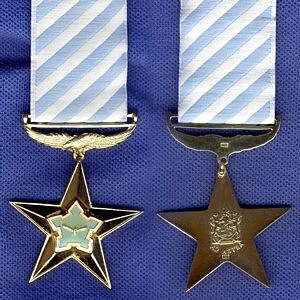
The Nkwe ya Selefera - Silver Leopard, post-nominal letters NS, was instituted by the President of the Republic of South Africa on 16 April 2003 and came into effect on 27 April 2003. It is South Africa's second highest military decoration for bravery.

The Nkwe ya Boronse - Bronze Leopard, post-nominal letters NB, is a military decoration for bravery which was instituted in 2003. It is South Africa's third highest military decoration for bravery.

The Louw Wepener Medal, post-nominal letters LWM, is a South African military decoration for bravery which was instituted by the Republic of South Africa on 20 October 1967. It was awarded to members of the South African Defence Force for courageous or heroic deeds in saving lives. The Louw Wepener Medal was discontinued on 1 July 1975, when a new set of decorations and medals was instituted.

The Military Merit Medal, post-nominal letters MMM, is a military decoration which was instituted in the Republic of South Africa on 9 October 1974 as the Chief of the Defence Force's Commendation Medal. It could be awarded to all ranks of the South African Defence Force for service of a high order.

The Southern Cross Decoration, post-nominal letters SD, is a South African military decoration for merit which was instituted by the Republic on 1 July 1975. It was awarded to officers of the South African Defence Force for outstanding service of the highest order and utmost devotion to duty.

The Pro Merito Decoration, post-nominal letters PMD, is a military decoration for merit which was instituted by the Republic of South Africa on 1 July 1975. It was awarded to other ranks of the South African Defence Force for outstanding service of the highest order and utmost devotion to duty.
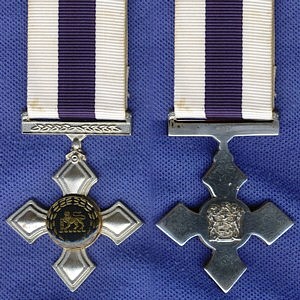
The Navy Cross, post-nominal letters CN is a military decoration which was instituted by the Republic of South Africa in 1987. It was awarded to members of the South African Navy for bravery. It was discontinued in 2003, but backdated awards can still be made for acts of bravery during this period.

The Pro Virtute Decoration, post-nominal letters PVD, is a military decoration for bravery which was instituted by the Republic of South Africa in 1987. It was awarded to officers of the South African Defence Force for distinguished conduct and exceptional leadership during combat operations in the field.

The Air Force Cross, post-nominal letters CA, is a South African military decoration which was instituted by the Republic of South Africa in 1987. It was awarded to members of the South African Air Force for bravery. The decoration was discontinued in 2003, but backdated awards can still be made for acts of bravery during this period.
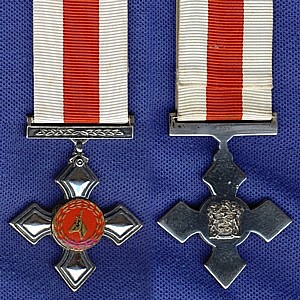
The Army Cross, post-nominal letters CM, is a military decoration which was instituted by the Republic of South Africa in 1987. It was awarded to members of the South African Army for bravery. The Army Cross was discontinued in 2003, but backdated awards can still be made for acts of bravery during this period.
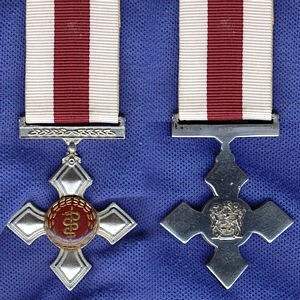
The Medical Service Cross, post-nominal letters CC, is a military decoration which was instituted by the Republic of South Africa in 1987. It was awarded to members of the South African Medical Service for bravery. The Medical Service Cross was discontinued in 2003, but backdated awards can still be made for acts of bravery during this period.

The Southern Cross Medal of 1975, post-nominal letters SM, is a military decoration which was instituted by the Republic of South Africa on 1 July 1975. It was awarded to officers of the South African Defence Force for exceptionally meritorious service and particular devotion to duty.

The Pro Merito Medal of 1975, post-nominal letters PMM, is a military decoration which was instituted by the Republic of South Africa on 1 July 1975. It was awarded to other ranks of the South African Defence Force for exceptionally meritorious service and particular devotion to duty, and was the non-commissioned officers' version of the Southern Cross Medal of 1975 (SM).

The Cross for Bravery was instituted by the State President of the Republic of Transkei, for award to all ranks as a decoration for bravery.

The Defence Force Merit Medal was instituted by the State President of the Republic of Bophuthatswana in 1982, for award to all ranks for extraordinarily excellent service and particular devotion to duty.

The Distinguished Gallantry Medal was instituted by the State President of the Republic of Bophuthatswana in 1982, for award to all ranks for extraordinary gallantry.

The Star for Bravery in Gold, post-nominal letters SBG, was instituted by the President of the Republic of South Africa in April 1996. It was awarded to veteran cadres of Umkhonto we Sizwe, the military wing of the African National Congress, who have distinguished themselves during the "struggle" by performing acts of exceptional bravery in great danger.
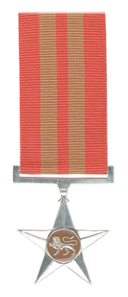
The Star for Bravery in Silver, post-nominal letters SBS, was instituted by the President of the Republic of South Africa in April 1996. It was awarded to veteran cadres of Umkhonto we Sizwe, the military wing of the African National Congress, who had distinguished themselves during the "struggle" by performing acts of bravery.
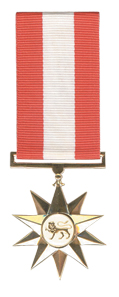
The Gold Star for Bravery, post-nominal letters GSB, was instituted by the President of the Republic of South Africa in April 1996. It was awarded to veteran cadres of the Azanian People's Liberation Army, the military wing of the Pan Africanist Congress, who had distinguished themselves during the "struggle" by performing acts of exceptional bravery in great danger.

The Bravery Star in Silver, post-nominal letters BSS, was instituted by the President of the Republic of South Africa in April 1996. It was awarded to veteran cadres of the Azanian People's Liberation Army, the military wing of the Pan Africanist Congress, who had distinguished themselves during "the struggle" by performing acts of bravery.
